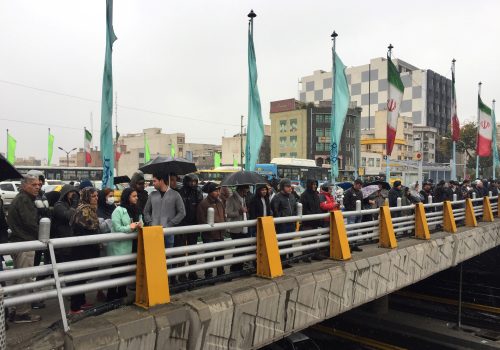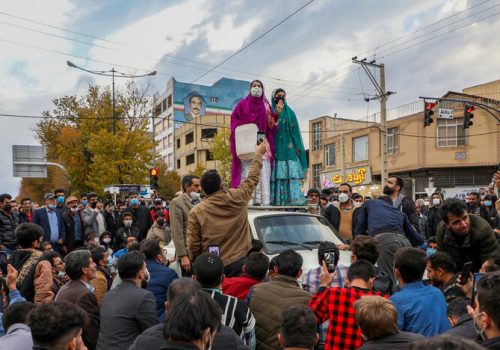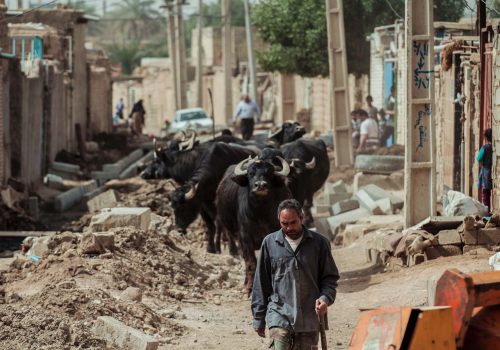The Ebrahim Raisi government just jacked up food prices. Iranians are understandably angry.
NOTE: Photo used is from 2013.
Despite Tehran’s grand gestures about “eroding poverty” in less than a year and “kicking the United States out of the region,” Iran’s economy is descending further into chaos by the hour. The government of hardline President Ebrahim Raisi—who has been in office for less than a year—has opted to introduce coupons for almost everything from bread to Internet.
In the face of the global threat to food security caused by Russia’s invasion of Ukraine, a massive budget deficit that is projected to climb as high as $21 billion, raging inflation that is estimated at well above the official figure of 40 percent, and food prices more than doubling (rice 130 percent and potatoes 167 percent) over the past year, Tehran has resorted to its tried and tested tactic of hiking prices and rationing goods.
On May 3, the Raisi administration introduced a new set of wheat and flour prices for different purposes, including bread and pasta. The price of flour has since jacked up five-fold and has increased by ten-fold for bakeries selling baguettes and similar products.
At the same time, the government vowed that the price of traditional Iranian bread would remain unchanged until the end of the Iranian calendar year (March 2023). However, local media reports that these prices have already tripled at some bakeries.
The decision has led to a sharp surge in the price of pasta and harsh criticism of the Raisi administration by the local media, along with current and former officials, and even #Macaroni_Gate going viral on Persian language Twitter.
On May 12, the government announced that the prices hikes have been extended to cooking oil, chicken, eggs, and dairy products. Cooking oil price was increased by four-fold while the rates for the rest were doubled.
This decision came amid news of unrest in Khuzestan province on May 11 and nationwide Internet disruptions affecting major cities, including Tehran.
At the same time, in the backdrop of forestalled talks between Iran and world powers to revive the 2015 nuclear deal, forex rates climbed to a four-month high in Iran, with $1 equaling 307,500 rials on May 12.
Government on the fence
The Raisi government came under criticism from across the political spectrum after announcing the sharp price hikes as part of its plans to reform subsidies allocation. In response to the public outcry and to amend his public image, Iran’s president addressed the nation live on May 9. Striking a self-sacrificing tone, Raisi said that he won’t evade making “hard decisions” and called on people to “not panic.”
The president promised that “electronic coupons” would soon be issued, but, for the next two months and to curb the impact of the price hikes, a monthly “subsistence allowance” of 4 million rials ($13.4) would be allocated to each citizen.
Raisi argued that the decision to hike food prices was aimed at “fair redistribution” of subsidies and cracking down on “corruption and rent-seeking.” He also criticized his predecessor, Hassan Rouhani, for evading the “hard decision” of reforming the allocation of subsidies.
According to the government-controlled Plan and Budget Organization, Iran annually spends 9 quadrillion rials on subsidizing food, medicine, and an array of services ($31.7 billion at the market rate or $214 billion at the official rate).
Arguments in favor of cutting subsidies
The Iranian government argues that the gap between the price of staples in the global market and the subsidized rates in Iran has encouraged smuggling of the goods out of the country.
On the same day that the price hikes were announced, Minister of Agricultural Jihad, Seyyed Javad Sadatinejad, alleged that an unnamed neighboring country facing a three million ton shortage of wheat had intended to “smuggle” the product out of Iran. He continued by lamenting that Tehran “cannot physically stop” the smugglers, therefore, it has been left with no option but to hike prices to curb the economic advantage of smuggling.
The minister also partially blamed the price hikes on the war in Ukraine, which has disrupted the global food supply, which was already frayed after two years of the COVID-19 pandemic (Russia and Ukraine jointly account for 29 percent of global wheat exports and 62 percent of sunflower oil).
The argument about curbing smuggling has been ridiculed by many Iranians online, including Mahdi Khorramdel, one of the editors of Tabnak News Agency. He pointed to the contradiction between the Islamic Republic’s claim of being an “island of stability and security” amid the tensions engulfing the Middle East and the country’s borders allegedly being “so porous that billions of dollars can be smuggled through them annually.”
Supreme Leader, hardliners to the rescue
Almost a week after the price hikes and, in a meeting with workers’ representatives on May 9, Supreme Leader Ayatollah Ali Khamenei came out in support of the government’s economic policies and demanded that “all power branches, agencies, and the general public must help the government” in implementing its “important” economic programs.
As is customary with Khamenei, he didn’t elaborate or specify the programs he was speaking of. This cryptic approach has historically allowed the Supreme Leader to distance himself from their fallout.
Since the measures were introduced, news agencies close to Iran’s Islamic Revolutionary Guards (IRGC), including Fars and Tasnim, have vehemently proclaimed their support for the administration. Additionally, Friday prayers Imams of Tehran—who are appointees of the Supreme Leader—have lent the government their support and blamed former President Rouhani for the current “sufferings,” while voicing concerns over the economic hardships that people are facing.
Although hardline dailies–such as Kayhan–have been consistently vocal in their support of the administration, papers like Vatan-e Emruz have also run stories mildly criticizing the government for not “persuading” the public in advance.
At the same time, the student branch of the Basij, the militia arm of the IRGC, has criticized the government for hiking prices “without proper planning,” adding that people are “not prepared” for the move. The group—made up of staunch university-level student supporters of the Islamic Republic—also cautioned that the price hikes could lead to “social unrest.”
However, senior Basij officials like Moslem Moein, the head of the cyber division of the militia, have defended the policy, saying it is the cost of “purging” the economy from “smugglers” affiliated with the former administration.
Rift between government and parliament
Over the past two years, winning elections that saw historically low turnouts, hardliners took over the executive and legislative branches, making their grip on power tighter. However, over the past couple of months, a rift has grown between President Raisi and hardline speaker of Parliament, Mohammad Baqer Qalibaf. Qalibaf has criticized the Raisi administration for causing “distress among people” and hiking wheat prices before introducing “electronic coupons,” which, according to him, have been mandated by the budget law. Qalibaf also claims that Iran’s budget law for the current Iranian calendar year (started in March) mandates that the government must use “smart coupons” to offer staples at September 2021 rates.
Furthermore, prominent MPs scrambled to distance themselves from the controversial policy as the price hikes kicked in.
In return, President Raisi tried to mend ties with parliament in his May 9 interview and also push the legislative branch to partially shoulder responsibility for the decision. He said that, by “redistributing” subsidies, the administration was exclusively following guidelines set by parliament in the budget law.
Paper calls on government to resign
Since the government announced its decision to hike food prices, it has come under fire from reformist dailies like Etemad, Ebtekar, and Shargh. But one of the harshest jabs Raisi faced came from a moderate conservative daily, Jomhouri-e Eslami.
Close to political factions aligned with late former President Ali Akbar Hashemi Rafsanjani, the paper called on President Raisi to “have the courage to step down since it has become clear that he cannot resolve the country’s problems.”
In a front-page op-ed, the paper’s editor-in-chief, Masih Mohajeri, argued that speaking of a hike in bread prices is like “setting fire to a gunpowder depot” that can endanger the existence of the Islamic Republic as a whole.
Tasnim News Agency, close to the IRGC, came to the defense of the beleaguered president and demanded not only the resignation of Mohajeri, but also accused him of using the bread prices “as a pretext to attack” the current administration.
Protests and partial Internet shutdown
Opposition to the government’s decision hasn’t remained limited to print and online spaces. It has also spilled over onto the streets of the impoverished southern Khuzestan province since May 6.
Footage shared on social media shows heavy riot police presence in the cities of Izeh, Behbahan, Susangerd, and Mahshahr. Some videos show trash boxes and tiers that have been set ablaze by protesters.
As soon as calls were issued for protests on May 6, authorities, unsurprisingly, resorted to imposing a partial Internet shutdown in the province, which has continued well into May 10. According to rights groups, at least twenty people have been arrested in one city. According to social media report the tensions continued well into May 11 as well.
Data released by American content delivery network Cloudflare also shows that the Internet disruptions have spread to a large part of Iran’s communication network, slowing down connections across the country, including Karaj, Isfahan, Yazd, Qazvin, and the capital.
This isn’t the first time that the clerical establishment has used partial Internet shutdowns to crack down on dissenting voices in Khuzestan province, which is populated by Iran’s impoverished Ahwazi Arab ethnic minority.
In July 2021, in response to peaceful water protests, authorities imposed a partial Internet shutdown in Khuzestan and used unlawful force, live ammunition, and pellet rounds against unarmed and peaceful protesters.
The Islamic Republic’s readiness to resort to Internet shutdowns and use of disproportionate force starkly echoes the November 2019 protests that were triggered by a three-fold surge in fuel prices. The widespread protests resulted in more than a week-long nationwide Internet shutdown and the arresting and killing of thousands of unarmed protesters.
Perhaps, as one cleric warned on Twitter, the government’s plan for “eradicating poverty might be the elimination of the poor.”
Khosro Sayeh Isfahani is an advocate, journalist, and Internet researcher with years of experience working in Iran, including work related to the LGBTQI community.
Further reading
Tue, Nov 9, 2021
From November 2019 to Khuzestan protests, lack of accountability is emblematic of Iran’s plague of impunity
IranSource By
Without concrete action to fight the plague of impunity that covers Iran, these violent events will only continue to occur and the Iranian people will continue to suffer.
Mon, Dec 13, 2021
Iran’s water is running dry. Now its water woes are worsening.
IranSource By
With the Islamic Republic disregarding the environmental and human costs of erratic development projects, coupled with the climate catastrophe that the world is facing, Iran has plunged headlong into a crisis with no safe shore in sight.
Fri, Jul 30, 2021
The grapes of Khuzestan’s wrath
IranSource By
After decades of poor environmental governance and mismanagement of water resources in Iran’s southwestern Khuzestan province, it’s not surprising that people have taken to the streets once again since July 15, prompting a violent crackdown by security forces and near total internet shutdown.
Image: An Iranian young boy pushes a cart as he and her mother attend Tehran's Megamall for shopping on September 30, 2013. (Photo by Morteza Nikoubazl/NurPhoto)


